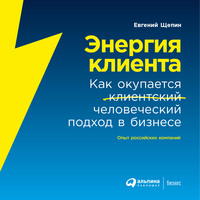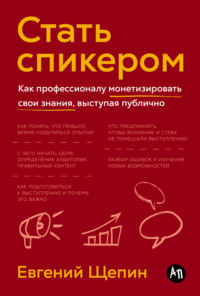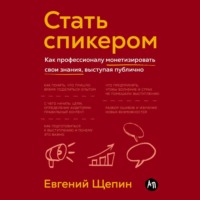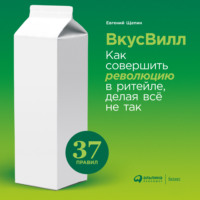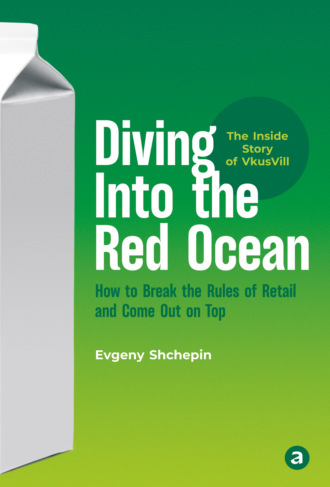
Полная версия
Diving Into the Red Ocean. How to Break the Rules of Retail and Come Out on Top

Evgeny Shchepin
Diving Into the Red Ocean: How to Break the Rules of Retail and Come Out on Top
Alpina
4th Magistralnaya 5, bld. 1
Office 159-169
123007, Moscow, Russia
International@alpina.ru
Managing Editor: Marina Krasavina
Project Editor: Natalia Pepelina
Translator: Andrew Freeburg
Copyeditor: Jennifer Eremeeva
Proofreaders: Beth Dymond, Anna Brown
Cover design: Yuri Buga
All rights reserved. No part of this book may be reproduced in any form or by any electronic or mechanical means, including information storage and retrieval systems, without written permission from the publisher, except by a reviewer who may quote passages in a review.
Copyright © 2021 by Evgeny Shchepin
© Electronic edition. Alpina, 2022
* * *Thanks for choosing to read this book about VkusVill!
Zhenya (Evgeny) Shchepin decided to write it a long time ago. I was not fond of the idea then, and I cannot say I am now. After all, a book is like a photo: it only captures a single moment. A company, however, is a living organism: it is constantly changing, learning, and reacting to changes in its surrounding environment. Before we even submitted the book to the publishing house, we had already produced several new development strategies and ideas.
I hope this book will speak to anyone who would like to start a company or tackle an ambitious project that the most important thing is to focus on your customer. The customer's interests should always be more important than profit and the interests of your investors. After all, a company that keeps its customers truly satisfied is never weak, particularly financially.
Andrey Krivenko, founder of Izbyonka and VkusVillRULE 0
OR AN UNUSUAL INTRODUCTION
This book could have come out two years ago; or it could have never come out at all. And this is VkusVill in a nutshell.
Greetings! My name is Evgeny Shchepin, and I am the author of this book. As a reader, I do not really like introductions. More often than not, they are far too pompous or academic. By the end of the first paragraph, I want to yawn, if not put the book down entirely. So, I face a challenging task: to tell you why we authored this book, while also not veering into excessive nerdiness or business theories that will send you off to sleep.
My initial dream was that Andrey Krivenko, founder of Izbyonka and VkusVill, would write it. After all, who understands all the nuances and subtleties of his business better than Andrey? However, you need to know Andrey personally to imagine the look on his face when I mentioned that idea. He even asked again, just in case, to make sure he did not mishear me: "Me? Write a book?" Then he raised his eyebrows as high as they would go.
Andrey has a phenomenal character: hundreds of entrepreneurs from all over the country dream of meeting him, believing that half an hour of face-to-face conversation with him might, at least, unlock some new knowledge; at most, lead to total enlightenment and a feeling of eternal harmony.
In fact, neither of these will happen. Andrey's response to questions such as "What was it like?" is that he no longer remembers. And at questions such as "What will happen?" he shrugs, explaining that nobody can know the future, so making any plans is pointless.
But do not get him wrong! Andrey is not in the least snobbish: he is cheerful, clever, creative, and has good manners. You can talk with Andrey for hours about anything. He just honestly does not understand what is so special about his business achievements, and why people are prepared to fly seven hours from the other side of the country for a thirty-minute meeting with him. After all, when a graduate of the Moscow Institute of Physics and Technology does not understand something, he does not make excuses for himself.
That is more or less how I became the author of this book about VkusVill and Izbyonka. I took matters into my own hands and introduced the world to the processes behind the inception, launch, and stable growth of the company we know today. I was born and grew up in the tiny city of Glazov, where I fell in love with creating text at a local teen newspaper, Avos-KA – which translates roughly as "Tote Bag." In 2010, I graduated with a journalism degree from the Ural State University, and by 2011 fate brought me to Izbyonka, which was just getting going and desperately in need of engagement with the outside world. Instantly, I became a member of the family in what was still a small company, where we burned with a similar passion for what we were doing.
Even then, I think I knew I would author this book. There is no other explanation for why I jotted down so many things over the course of eight years. I kept vivid memories in mind, observed and analyzed, and tried to regard the day-to-day life of our company through the lens of history and the search for cause-effect relationships.
The success of our company excites people. How do you start from a tiny dairy stand and build a major grocery chain with a thousand stores? How can you not take out a single loan in the process and develop a business using only your own money? How do you manage a company with over 12,000 employees without strict orders, regulations, KPI, or a budget? And most importantly, how do you grow twice every year but not lose the passion of a start-up? This book will answer all the questions above and reveal the secrets behind VkusVill's success.
Do not look for instructions here. This book is about something else. Here we will share our experiences and failures; uncovering our thoughts and concerns. In these pages you will find many examples of sincerity and humanity.
Above all, I did not want this book to be a neat, well-packaged business story, built on the successes and achievements of the company. If I had been an outside author, it might have turned out exactly like that, but I was privileged to be both an eyewitness and a participant in the processes I am writing about. The book uncovers a lot of behind-the-scenes details and some home truths that are tough to face. You may read about our mistakes and think, "What on earth were they thinking?" But we are not ashamed of our history: each mistake helped us to move forward.
The thought of another business book appearing in Russia thrills me to the core – a book about a Russian company! We all love reading about American, European, and Japanese businesses and yet know so little about what is happening at home.
I hope this story about VkusVill will be a breath of fresh air for you and inspire you to leap in a new direction.
RULE 1Even amid the fiercest battles for preeminence in the market, there are always moments of peace. Learn this rule – it will come in handy!On 31 December 2008, Andrey Krivenko quit his job as the chief financial officer (CFO) of Agama Trade, a major seafood distributor. This was the moment that the story of Izbyonka (which translates as "log cabin") and VkusVill (which translates as "tasty town") began.
After five years of working at Agama, Andrey had grown weary of corporate life and decided to change fields. By then, he had already realized that the time had come for meaningful changes; big businesses could no longer stew in their own juices but needed to focus on the customer.
Andrey posted his CV online, searching for an opening for a CEO. He described himself as a top manager who prided himself on his customer-focused attitude, and he waited for interview requests to come in. In the meantime, he devoured book after book.
Andrey's proposal attracted the interest of precisely zero companies – not one call for the entire duration of his search! Companies were looking for CEOs who would increase their efficiency and please investors. But a top manager who studied customers' problems and tried to solve them? Heaven forbid! Who on earth needed someone like that?
Having failed to attract potential employers, Andrey decided to create his own company. With a million rubles ($13,700) of personal savings, Andrey began the steep trek up Mount Entrepreneurship. His head was brimming with ideas, but most of them were unsustainable.
Andrey rejected the idea of opening a patient-friendly dental clinic because of the narrow specialization needed in the field. Outlets selling unpasteurized "live" beer – which in Moscow were springing up like mushrooms – appealed to him, with their promise of minimal outlay and a quick return on investment, but they failed to inspire him with their ideology. An auto repair shop required too much start-up capital, and that industry was not creating a fire in his belly.
The idea of selling natural dairy products came to him as he looked at a shop window full of milk and yogurt, which was due to expire in a month's time. He could not bring himself to buy such rubbish for his young children. Farmers' markets provided an alternative source where it was possible to purchase food that did not feature an entire periodic table in their ingredient lists from private producers of the market, but they failed to inspire complete trust.
Andrey recalls: "One day, I was coming back from the market and realized that I really liked the taste of the dairy products I bought from farmers, but every time I bought them with apprehension: I did not understand how and who made it, and where and how long they stored it. The hygiene question stressed me out more than anything: a merchant would cut off a piece of cheese, then count his money without even washing his hands, over and over, all day long. That thought kept turning over in my mind as I walked home from the market."
And as Andrey reflected on it, a vision of his dream store became clearer. On the one hand, natural products with short shelf lives; on the other hand, producers with organized systems of quality control and certificates of compliance, rather than farmers simply with notes from their veterinarians. And there would be no contact between the vendor and the final product.

THE NICHE THAT ANDREY DISCOVERED WAS OF NO INTEREST TO THE BIG CHAINS. FOR THOSE CLUMSY GIANTS, THE SECTOR WAS FAR TOO COMPLEX AND WAY TOO SMALL TO WORRY ABOUT.
Right on cue, Andrey was reading W. Chan Kim and Renée Mauborgne's book, Blue Ocean Shift[1], which became the lodestar for the company that would become Izbyonka. Andrey embraced the concept that the best way to win in a competitive fight is not to get involved in the first place. The company's strategy should be oriented on the client rather than the competition. This would allow the company to focus on innovation and do anything it cared to without looking over its shoulder.
At first glance, the retail grocery business is a classic "red ocean," where big chains can easily crush any retail start-up. But the niche that Andrey discovered was of no interest to the big chains. For those clumsy giants, it was far too complex and way too small to worry about.
Andrey summarizes: "After looking at these facts, I understood that there was an idea to work on. And after that, there was only one thing left to do: get stuck in."
RULE 2
Doing and analyzing is more important than analyzing and not doing anything.
First, Andrey began by recruiting employees who shared his approach to business. At the outset, it was essential to find someone with an excellent grasp of the dairy production process who was also a seasoned retail specialist. Andrey, the financier, confesses he was ill-informed about these aspects of the business.
"People often ask me what they need to start a business," Andrey explains with a helpless shrug, "… and I think that the key thing is to find people who understand at least something about that specific business. I did not have any clue about the inner workings of the dairy industry. All I knew was that the milk from the market was much better than from the store. But as for a cash register, or how to work with one? I had no idea."
Andrey searched for employees on a free job vacancy site; that is how he found Dmitry (Dima) Kozyrev, a dairy production technician, and Evgeny Semery, a retail manager. Though Andrey could pay only a minimal salary of about 20,000 rubles, he convinced the two men that the venture would become prosperous and would soon see a sharp rise in turnover. Semery did not last long – later, in an interview, Andrey explained that they "just did not get on in ideological grounds." But Dmitry remained, and today he is one of VkusVill's most successful and productive technicians.

From the start, Dmitry played a key role in the company, thanks to his expertise in the production process. He could speak in the language of the production line rather than using layman's terms, such as "salty," "tasty," "hot," or "sweet". He knew how to treat the product, what to add, and how to improve it, for example, by removing excess moisture or replacing one starter culture with another.
"In 2009, I ran across an ad online for a dairy production technician and rang the number," recalls Dmitry. "A young man answered and introduced himself as Andrey. We met at the food court of the Molodyozhnaya mall. He said he wanted to start an unusual venture, creating a small retail chain to sell natural dairy products. I found that a very appealing idea, though now I cannot recall why exactly. I suppose that was because this was not going to be a typical Monday to Friday, 9:00 a. m. to 5:00 p. m. routine. It was interesting. The idea of working with natural products did not embarrass me at all: I understood that if we did everything right, it was real. Andrey has an excellent capacity for sincerely engaging people if he believes in something himself. He could do it then, and he's continued to do so throughout the history of our company."
With Dmitry at his side, Andrey went in search of suppliers. They visited almost fifty producers in a radius of 200–300 kilometers from Moscow before they found someone willing to produce milk products for the Izbyonka brand without the general powdered milk, starch, and preservatives.
"They looked at us like we were idiots," Andrey recalls. "We did not have a single store, but we were making as many demands as if we were a large retail chain such as 'Auchan'."
They found their first supplier – SAPK-Moloko – in the tiny village of Zherdevo in the Kaluga Region. It was a small plant that had just opened a new production line and was looking for any possible sales distribution channels. Their products were already available in local stores, but that demand was insufficient.
Andrey and Dmitry convinced the director to accept a delayed payment, thus, clinching their first supplier. On 12 May 2009, the first Izbyonka location opened.
They started with minimal expenses. Renting 5 square meters at the Troitsky mall in Strogino cost only 16,000 rubles a month, and a commercial refrigerator cost them 20,000 rubles. They made the sign themselves in the back lot of the Tushinsky market. They shelved any thoughts about proper marketing: the primary goal was to get started. Andrey and Dmitry traded shifts transporting the product from the plant to the mall.
"You wake up at three in the morning, drive to the plant in Kaluga, stuff the car with a product, then unload it at nine in Moscow," recalls Dmitry, reminiscing about those early days. "Andrey took two shifts delivering the product, and I took two shifts. Of course, we were not following the established rules: we were not adhering to storage regulations; we wrapped the product up in blankets to make something that looked like a refrigerator. After a month and a half of this, we realized it was time to look for someone with a proper vehicle."
The initial stage of a business is an ideal time to go slightly off-piste (within reasonable limits) and bend the rules a little, while avoiding any penalties or fines. As far as the authorities and regulators are concerned, your company does not exist yet; the few clients you have are not highly active. For a start-up, each day can easily be its last. Bending the rules at this stage is a necessary evil, but only insofar as this "illegal" period enables you to finetune your business processes and hone them until they are functional, efficient, and legal.
Over three months, Andrey opened two more Izbyonka locations, and created an intuitive software program to automate product ordering, oriented to the volume of sales from the previous period, so that each day the program became "smarter."
But success still eluded them. For nearly four months, each of the three locations had been losing money, and none of them enjoyed heavy customer traffic. The initial start-up capital of a million rubles was running out.

It was time to start Plan B.
"At first," recalls Andrey, "I opened four locations. However, the first three Izbyonkas proved this was not the right thing to do. I was ready to end this project and look for a new, more promising niche. But I did not have any new business ideas, so I opened the fourth location – to at least fulfill my initial plan."
If it was not for that one decision, nothing would have come about: no VkusVill, no producers doing well because of VkusVill, and no book…
The fourth store opened in a new location. Before this, Andrey had intuitively chosen available space at farmers' markets, counting on the considerable traffic from the market's customers. But the final experimental location was in a shopping mall, close to a Billa supermarket in Mitino (a large suburb of Moscow).
The experiment was a slam dunk, and Izbyonka found its target audience. The suburb – Mitino – was a young district with a lot of young families with small children. For them, high-quality dairy products are a priority when shopping for groceries. It turned out that foot traffic in a shopping mall suited Izbyonka far better than the farmers' markets.
The first day in the shopping mall showed Andrey and his team that it was far too early to admit defeat. Izbyonka's refrigerators were empty by lunchtime. News of a new and innovative dairy shop with domestic products spread like wildfire, simply by word of mouth. And on that day, we grasped the immense power of the grapevine.

We modeled each successive Izbyonka on the Mitino experience. Being focused on young mothers with children, we were "squatting" near major supermarkets by offering a dramatically different product from the large chains. We abandoned the idea of farmers' markets and everything that was excessively local.
"I learned an important lesson from Izbyonka's identity crisis," says Andrey. "When you try to offer a brand-new product or service, it is important to try all kinds of different tactics and options. Your vision may very well differ from your customers' needs and desires. And never judge the success or failure of a project just on one attempt. Opening a business is a process of experimentation and adjustment to the situation. Often something that seemed to flop at the start ends up being the winning formula for your success."
RULE 3
Hire people who you find interesting and feel comfortable with, especially at the beginning.
By the start of 2010, Izbyonka was safely off life support. Its retail locations began to pay off, and the company took its first tentative steps. It was still a start-up, affected heavily by the world around it, but – borrowing yet another medical term – we observed an improvement in the patient's condition.
That is when the key employees appeared at the company, the ones who remain at its core: Alena Nesiforova, Renata Yurash, Tatyana Berestovaya, Evgeny Kurvyakov, Maksim Fedorov, and others.
The company now lives by the rules of a unified, well-functioning organism: perhaps not an ideal one, but certainly a harmonious one. In a perfect organism, all the organs work flawlessly, as if in a laboratory. Entire systems can fail in a coherent one, but the organism will turn on its immune system's defense mechanism to fix them.
Meanwhile, the concept of "us" is developing; an important phenomenon in terms of a healthy corporate culture.
Henceforth I will use "we" to mean our collective hive mind, although I can anticipate many questions from readers: "Who are 'we'? What do you mean, 'we decided'?"
Honestly, we do not have a standard answer to these questions. At some point, it became difficult to determine who produced an idea and who developed it into a working concept, or who first questioned the viability of an idea, or the person who caught the whiff of a mood, then set a rule and was the first to follow that rule. We became such integral parts of each other that, over time, distinguishing the "I" became meaningless.
Today, if you look at the way we assembled the puzzle pieces of the small but ambitious Izbyonka team, you might conclude that it was merely dumb luck, because some coincidences are otherwise impossible to explain.
Now, Alexey Ilyichev owns a medium-sized transport company that provides delivery services for Izbyonka and VkusVill. His success story amazes and defies any logical explanation.
"I live in the Tushino district, near the mall, where the second Izbyonka opened. Once, my wife asked me to buy sour cream. She told me to look in the dairy stall there. I did not find a single dairy stall and bought sour cream elsewhere. Later, my wife brought me to Izbyonka and told me to mark it as the place she wants me to buy all our dairy from. I recall a salesperson and a young man running around with boxes, and later I realized that the young man was Andrey Krivenko and Nadezhda Spirova was the salesclerk."
Ilyichev continues: "I had already been working for myself for a long time in the (private) transportation business. Out of curiosity, I asked Andrey what trucks they drove. He answered that they were just getting started and driving products around by themselves but were looking for someone to take the job on. I gave him my phone number, and ten days later, Andrey called me back. We met at the warehouse, and he showed me products and said: 'Here is the milk, and here is the kefir.' I answered: 'Right, but what is next?' Andrey said, with a surprise: 'What do you mean, what is next? Take it, drive it, unload it.' I did not even show him my passport!"
Alexey recalls the early days, "I could not believe that Andrey just handed me the keys to his warehouse full of product! It was fun back then. Such enthusiasm! Of course, I knew from the beginning that I would not be the only driver for long, and that is what exactly happened. After we opened the sixth outlet, the question of a second vehicle came up. But Andrey stepped away from solving transportation questions from the very beginning, so I handled everything." The next story is about Alena Nesiforova, who worked as a market researcher for DuPont. Nevertheless, she swapped her business trips to Paris and Barcelona for work trips to Kaluga and Ryazan after deciding to work for Izbyonka:

"I studied at the Moscow State Linguistic University, the best linguistic university in the country, and at one point tried my hand at tutoring. I posted an advert on a website, and the first call came from Alena Krivenko (Andrey's wife). She had a lot on her plate, not a lot of time, and a need for English. I was the perfect choice, as I lived right across the street from her son's kindergarten. We started working together and understood that English was not the only thing that we had in common. We talked a lot about life. A couple of years after we met, Alena told me that her husband Andrey was planning to launch Izbyonka and suggested that I give it a shot. I agreed it was a significant risk – I was leaving a large, stable company to jump into the unknown. When I look back on it now, it seems like such an adventure!"


